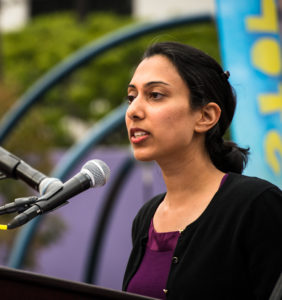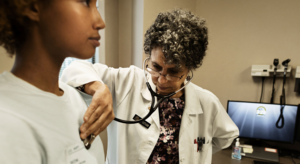
Today I am excited to share with you an interview with my client, Dr. Devki Patel. She made the successful transition from pathologist to working for California’s Medicaid program. A big thank you to Devki for making her story accessible.
Q: How did you decide to transition out of your specialty?
Dr. Devki: I had been unhappy during my pathology training and career for a long time but didn’t have the courage to leave until the unexpected death of my younger brother made me reevaluate my priorities in life. I wanted a career that allowed me to live a healthier life with less stress and that aligned more with my interests, so I resigned from my group practice to grieve and explore other career options.
Q: Why did you initially choose pathology?
Dr. Devki: Pathology was not on my radar when I started medical school. I had always been drawn to public health and non-profits that improve the quality of life for low-income communities. That was what got me into medicine in the first place. I kept pursuing pathology because other people told me I was talented and had an eye for it, even early on in medical school. I had initially thought I would go into family medicine, but I wasn’t sure about the struggle of managing patients. During clinical rotations, I realized I didn’t have the high energy level required to be involved in direct patient care.
Q: Was it difficult to find a non-clinical career?
Dr. Devki: Yes, I was unsure of what path to pursue after I left my career so I did volunteer work in my areas of interest (child literacy and environmental health). For 10 months, I explored non-profit, management consulting, and teaching positions on my own and considered going back to school for a masters of public health. I was also dealing with grief over the loss of my brother as well as a loss of my identity by no longer being a practicing physician, which made the process even more difficult. After I started Heather’s coaching program, I received job offers for non-clinical positions where my medical knowledge was considered an asset. I truly benefited from her services and her connections with previous clients which helped me land my current position.
Q: What do you do in your current position?
Dr. Devki: I work as a medical consultant for the Medicaid program in California. I perform medical reviews where I analyze medical documentation to determine if a patient is stable enough to transition from fee-for-service to a managed care plan. Also, I help develop health policy for the Medicaid managed care plans and analyze healthcare-related bills that are proposed by the state legislature. In addition, I work on 2 projects related to social determinants of health and health disparities which involve research and analyzing quality metrics.
Q: What is a typical day like for you?
Dr. Devki: I start work at 7:30 am and leave at 4 pm. It’s a desk job so I am sitting for the majority of the day. I spend most of my time reading, writing, and analyzing documents on the computer as well as doing an occasional literature review. I am also involved in a few projects that offer a heavy dose of team work and collaboration which have provided a wonderful balance to the solitary nature of my main duties.
Q: Given that you were trained in pathology, was it hard to switch gears to assessing a patient’s medical condition?
Dr. Devki: The transition was not difficult. At my residency program, the plasmapheresis unit was run by clinical pathology residents. So I was very experienced in obtaining a history and physical exam, assessing a patient’s medical stability, determining the amount/duration of plasmapheresis therapy, monitoring the procedure, and dealing with any adverse events. In this job, all new medical consultants are provided with training and supervision, so another experienced physician reviewed all my initial cases and provided feedback. And before I started the job, I did a lot of reading to enhance my clinical knowledge through literature reviews, UpToDate, specialty guidelines, etc.
Q: What do you like about your current job?
Dr. Devki: I feel fortunate to work in a job that serves low-income patients while being able to work on a variety of projects that include health policy, public health, quality improvement, and medical reviews. I have the flexibility to take care of appointments or family issues during the day as long as my work is completed, and my job is much less stressful than my previous career. I love walking outside during my lunch break, and my colleagues are great to work with!
Q: What do you wish were different?
Dr. Devki: I wish I could move around more! A desk job was difficult to adjust to since I used to run around a lot in my former career. Also, government works at a slow pace and there are multiple layers of management and red tape. That was a huge change! I had to adjust to getting things approved by management, waiting long periods of time for projects to progress, and attending many meetings.
Q: Do you miss clinical practice?
Dr. Devki: Overall, I do not miss practicing pathology, which assures me that I made the right decision. Being a young pathologist was tough due to the stress of making the right diagnosis for each case, the extensive amount of time spent viewing cases, and dealing with angry surgeons during frozen sections. I do miss the beauty of cells/tissues under the microscope as well as using my leadership skills as a practicing physician, but I am happy I transitioned to a government role.
Q: What kind of physician might enjoy this kind of work?
Dr. Devki: A physician who cares about public health and is willing to take a pay cut from their clinical job. Working in government requires a lot of patience because of the slow pace. For my role, any type of specialty would be appropriate. We have 2 pathologists and 3 family medicine physicians in our section.
Q: How might physicians find similar jobs in their state?
Dr. Devki: State non-clinical jobs can vary significantly: approving/denying treatments for patients, doing disability reviews, developing policy and benefits coverage, or performing audits and investigations. There should be online postings for state jobs, and the majority of them require an active state medical license. The application process in California is very long and complex and involves 2 separate rounds of applications for each job. I recommend talking to a current state employee to understand the application process and what roles are available for physicians (You can access the CalCareer website for California state jobs here).
Q: Any tips for doctors considering a non-clinical career transition?
Dr. Devki: Keep your medical licenses and specialty board certifications active. Save money for the time period you may not be working. Seek help from everyone you meet and keep asking questions! Physicians are used to a step-wise approach; yet, transitioning to a non-clinical role has been the most zig-zag path of my life. I struggled with creating non-clinical resumes and LinkedIn profiles, gaining the confidence to network with complete strangers, being open-minded to various types of non-clinical roles, and marketing myself.
There were many failures and rejections along the way, which I was not anticipating. The best advice I can give you is to be kind to yourself and allow failures to transform your driven, perfectionistic self into someone who is more vulnerable, resilient, and realistic. All of your efforts in transitioning to a non-clinical role with the right fit will pay off so don’t lose hope!
Well said. Thank you again, Dr. Devki.
Latest Posts
Find what you're looking for:
Popular Categories:
Career Change | Career Enhancement | Job Search | Personal Development
6 Comments
Leave a Comment























Great article, Heather. Thank you.
Thank you, Jane, for being a valued reader and commenter on this site! We appreciate you. I have to extend the thanks to Devki for her great interview and transition.
Devki, that was a great read about your zig-zag journey! Really enjoyed reading about your transition process!
Pranay, on behalf of Devki, I thank you very much for reading her interview and your supportive comments. It’s true that one’s path when transitioning from medicine, or any career for that matter, often has a fair amount of twists and turns. Zig-zag is a good descriptor. I know my transition from dermatology looked more like a crazy straw than a path! I am dating myself with this reference to a childhood straw that was so much fun but which I don’t see around much. Thank you again for reading and commenting, much appreciated. Heather
“The best advice I can give you is to be kind to yourself and allow failures to transform your driven, perfectionistic self into someone who is more vulnerable, resilient, and realistic…”- well said, Devki (the work hours are great, too!). Changing means following through in a process that is difficult; for me, the hardest was moving out of being stuck in that “high-performing physician” role and allowing myself to be fully imperfect and human once again!
Hello Clara, I shared your nice comment with Devkiand she was very appreciative. Thank you for your own words of advice. Because society and the medical-legal system expects and demands perfection from physicians we fall into the trap of doing the same to ourselves. Kudos to you for allowing yourself to be imperfect and perfectly human!